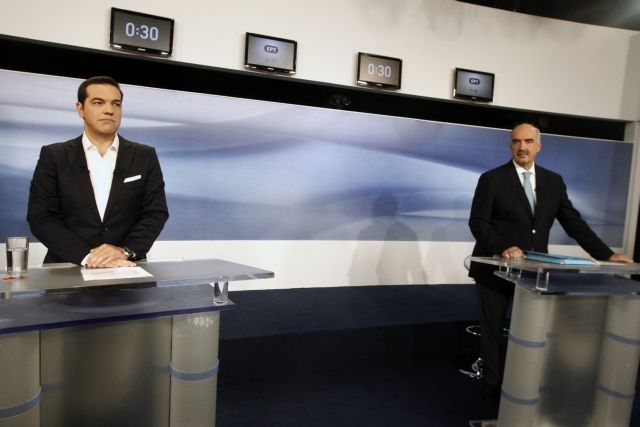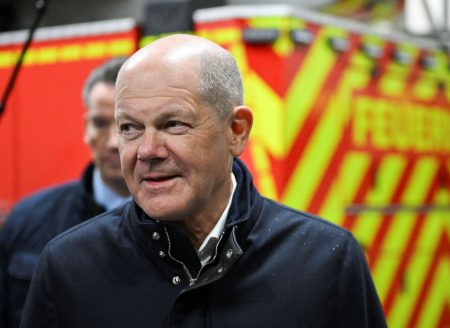The second debate, this time between SYRIZA leader Alexis Tsipras and New Democracy’s provisional president Evangelos Meimarakis, was arguably a livelier affair, with two main contenders clashing on the economy, the bailout, the negotiations with Greece’s partners and creditors, the possibility of post-electoral alliances and the refugee crisis. The first half of the debate was focused on domestic policy matters, while the second on foreign affairs. During the debate the two leaders also had the opportunity of interrupting and commenting on each other’s response.
In the first section of the debate Mr. Tsipras was asked about his post-election coalition plans, given the fact that it is unlikely that his party will manage to form a government on its own. Although he avoided giving a clear answer and estimated that the Independent Greeks will make it in Parliament, he ruled out any coalition with New Democracy, citing the fundamental differences on debt, labor relations and the public sector. Mr. Meimarakis appeared more conciliatory, claiming that if an agreement can be reached on a minimum of issues, then an alliance is possible.
Predictably the two leaders clashed on corruption, with Mr. Meimarakis accusing Mr. Tsipras of not taking any steps towards resolving corruption, as he professed in his election campaign pledges, while Mr. Tsipras noted how many from New Democracy have been involved in a series of major scandals.
The New Democracy leader accused Mr. Tsipras of scaring off investors – citing the mining operation in Skouries, the privatization of regional airports and COSCO’s involvement in Piraeus – and claimed that his party did not vote for the third bailout, but it rather supported the country’s European course. Mr. Tsipras responded that in the past five years, during ND’s time in power, a “terrifying 60% disinvestment” took place and claimed to have renegotiated better deals with a number of investors.
On the critical pension reform issue, which will be discussed with the creditors in the fall, Mr. Tsipras commented that he fought a “very tough battle” to maintain pensions and avoid the ‘zero deficit clause’. Nevertheless he underlined that the issue was a “time bomb”, whether a bailout agreement was in place or not, as the PSI and high rate of unemployment have created an explosive situation.
When asked why voters should trust his party, given that the crisis came after New Democracy being in power for so many year, Mr. Meimarakis responded that it was “no coincidence” that SYRIZA garnered only 3% of votes during that time “because the country was moving forward”. He further claimed that SYRIZA took advantage of the disappointment and anger at the crisis to climb to power. Mr. Meimarakis avoided making any promises and argued that he would be able to make any such commitments after creating a primary surplus.
Later Mr. Tsipras was asked why he should be voted in as Prime Minister, after making critical mistakes (in the negotiations with the creditors, the appointment of Mr. Varoufakis as Finance Minister etc), the SYRIZA leader stated that the Greek people want a Prime Minister who will speak the truth and cited Konstantinos Karamanlis, who claimed that “the other name for mistakes is experience”.
In the second section of the debate the two political leaders clashed on foreign affairs. Mr. Tsipras explained that the there are 5-6 areas in the bailout agreement that are still open for discussion – debt relief, the privatization fund, labor relations, red loans, auctions and the fate of ADMIE and DEI (which he underlined must remain in public hands). He also accused Mr. Meimarakis of allying himself with Angela Merkel and Wolfgang Schäuble in the European Parliament. The New Democracy leader avoided criticizing the stance of European right-wing parties on the Greek crisis and claimed that the debt was sustainable with the primary surpluses achieved by the Samaras-Venizelos administration.
On the refugee and migration crisis, Mr. Meimarakis claimed that the creation of Ministry of Migration will not necessarily provide a solution to such a sensitive matter and accused SYRIZA of adopting policies that “brought the migrants” to Greece. He was also critical of the caretaker Migration Minister Mr. Mouzalas, claiming that he was appointed at the recommendation of Mr. Tsipras alone.
In response, Mr. Tsipras noted that he took steps to address the refugee crisis and argued that NSRF funds would be used to cover needs. He further commented that he has underlined the importance of the refugee and migration crisis in Europe, along with his Italian counterpart Matteo Renzi. The SYRIZA leader added that Greece is a transit country for refugees, who want to travel to other countries.
When asked about foreign investments, Mr. Tsipras stressed that political and fiscal balance are important and that a series of legislative interventions are necessary in order to attract investments that will bring new jobs and growth. As such, problems and delays in bureaucracy, licensing and the administration of justice must be addressed, while adding that it is worth raising taxation.
In the final section of the debate the two leaders posed questions to each other, with Mr. Meimarakis accusing his opponent of making false promises regarding the bailout and that among the SYRIZA candidates are MPs who did not support the agreement in Parliament. As such, he question, how can people trust SYRIZA. Mr. Tsipras responded that a section of SYRIZA (namely the Left Platform) has departed and that New Democracy is terrorizing Greek voters over a possible SYRIZA win, as it did in the previous elections.
Furthermore Mr. Tsipras explained that by forming a coalition with the Independent Greeks and proposing Prokopis Pavlopoulos for the Presidency he demonstrated that his party is open for cooperation, “but not a national cover-up”. Mr. Tsipras also noted that despite claiming to want to cooperate with SYRIZA – Mr. Meimarakis has used harsh language calling him a “little liar” and “the 60-euro-PM” – Mr. Meimarakis wants to form an independent government.
The New Democracy leader began his answer by calling the director to “correct” the shot, so that Mr. Tsipras did not appear taller and commented that while he does not want Mr. Tsipras to even be a Government Vice President, he is “willing” to go together for six months or a year, after reaching an agreement. Mr. Tsipras responded that there can be no framework agreement with New Democracy and that it would be a “curse for the country” if Golden Dawn were to be appointed as the main opposition party.



